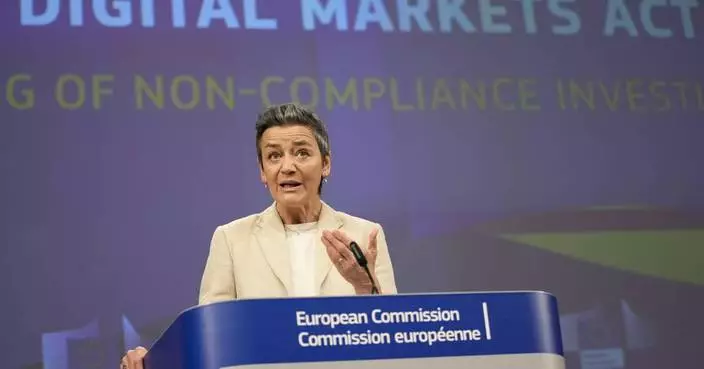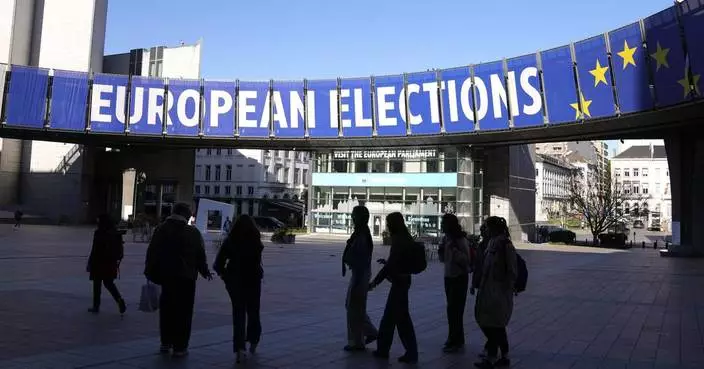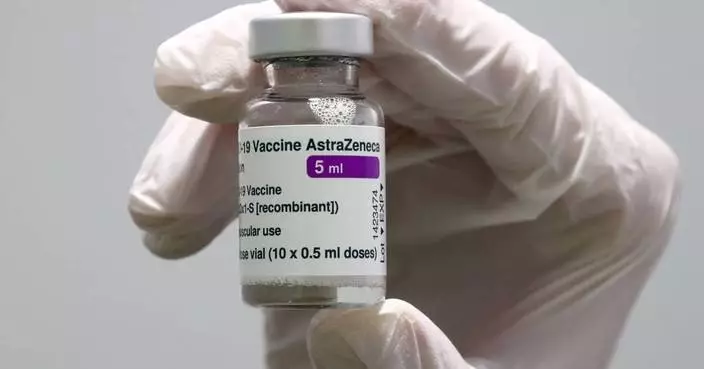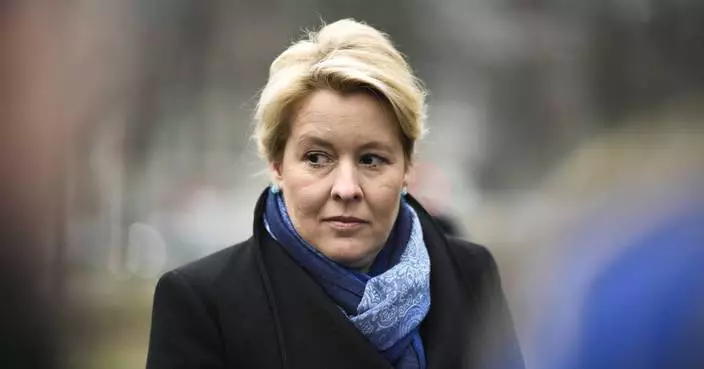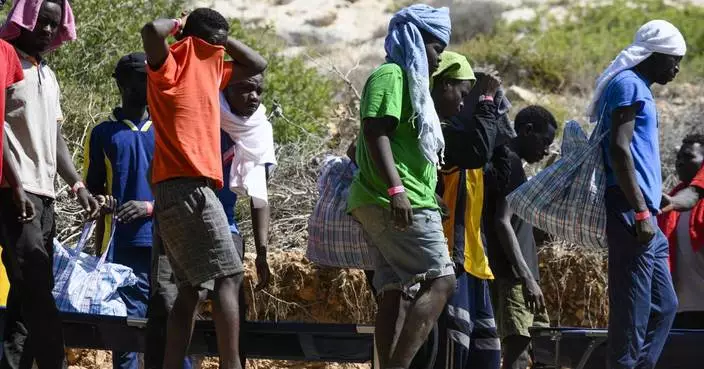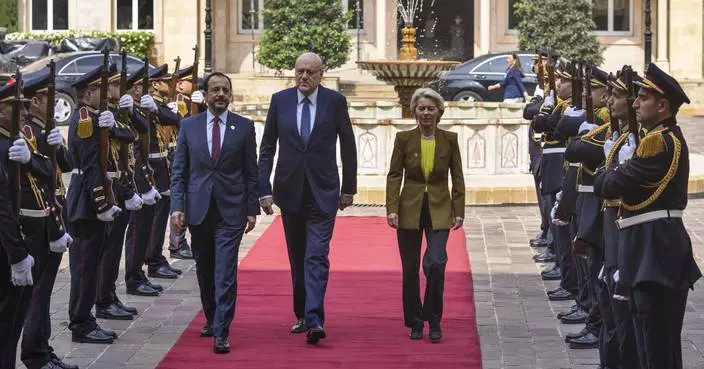Call it the aid wars.
The Trump administration is accusing President Nicolas Maduro of starving Venezuelans by blocking tons of American-supplied humanitarian aid stored next door in Colombia.
Click to Gallery
As tensions in Venezuela mount ahead of a Saturday showdown over humanitarian aid, both sides are digging in, highlighting how the South American nation's crisis has become the latest fault line in a battle for global influence by the former Cold War adversaries.
Russian state news agencies said Wednesday that a Russian shipment of medicine and medical equipment had arrived in Venezuela. The reports did not give the size of the shipment or say what it contained, though they cited a diplomatic source as saying the delivery was made under the aegis of the World Health Organization.
Still, he said the two global powers were on a collision course in Venezuela, making it harder to negotiate a de-escalation of tensions.
The Kremlin has sharply criticized the plan as reckless, accusing Guaido of seeking a pretext to call for a U.S. military intervention.
"This is undoubtedly a direct violation of the U.N. Charter and a direct intervention into the domestic affairs of an independent country," Lavrov said. "When you listen to some representatives of the U.S. administration, it seems that diplomacy is simply ignored."
In Russia, the Kremlin sees the opposition's plan to force it across the border as a reckless pretext for ordering a foreign military intervention.
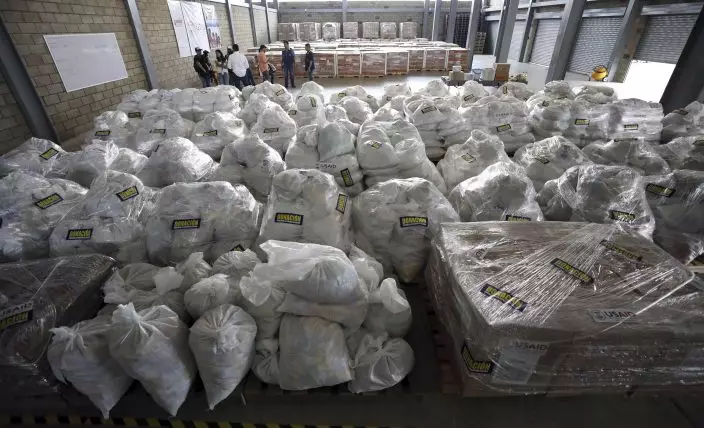
In this Tuesday, Feb. 19, 2019 photo, journalists and members of Colombia's government tour a warehouse where USAID humanitarian aid is stored near the Tienditas International Bridge on the outskirts of Cucuta, Colombia, on the border with Venezuela. Venezuela's self-proclaimed interim president Juan Guaido has been rallying international support for his challenge to Maduro and calling for international emergency aid. (AP PhotoFernando Vergara)
As tensions in Venezuela mount ahead of a Saturday showdown over humanitarian aid, both sides are digging in, highlighting how the South American nation's crisis has become the latest fault line in a battle for global influence by the former Cold War adversaries.
At stake is the future of Venezuela, a once oil-rich country gripped by hyperinflation and widespread shortages of food and medicine. Opposition leader Juan Guaido last month declared himself the country's rightful president, a claim backed by the U.S. and dozens of other nations that argue Maduro's re-election last year was fraudulent because most opposition candidates were barred from running.
Russia, long a staunch Maduro ally, has remained firmly behind the socialist leader.
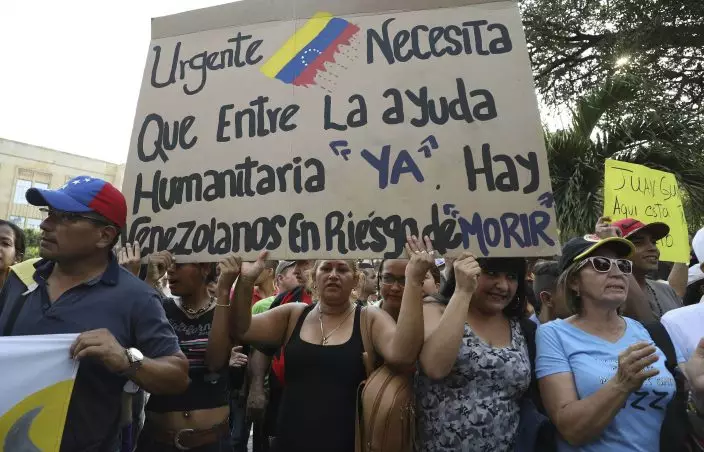
FILE - In this Feb. 12, 2019 file photo, Venezuelans living in Colombia protest the government of Venezuela's President Nicolas Maduro, and its blocking the entry of humanitarian aid, in Cucuta, Colombia, on the border with Venezuela. The sign reads in Spanish "Urgent. The entry of humanitarian help is needed now. There are Venezuelans at risk of dying." (AP PhotoFernando Vergara, File)
Russian state news agencies said Wednesday that a Russian shipment of medicine and medical equipment had arrived in Venezuela. The reports did not give the size of the shipment or say what it contained, though they cited a diplomatic source as saying the delivery was made under the aegis of the World Health Organization.
Hours earlier Maduro had said 300 tons of medicine and other aid was on its way from Russia.
Carlos Romero, an international affairs professor at the Central University of Venezuela, said that Russia's support for Maduro is more symbolic than consequential when compared to the intense pressure against the government being exerted by the U.S. in what he called "Washington's backyard."
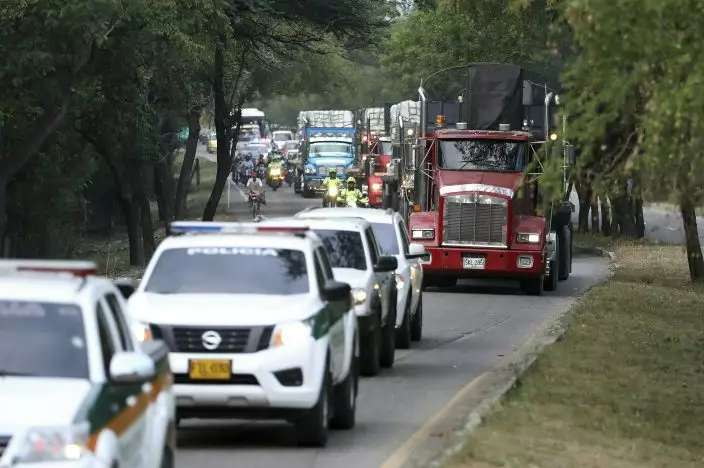
FILE - In this Feb. 16, 2019 file photo, trucks loaded with USAID humanitarian aid for Venezuela are escorted by police as they arrive at the Tienditas International Bridge in Cucuta, Colombia, on the border with Venezuela. President Nicolas Maduro is vowing to block the aid from entering Venezuela, saying the effort is part of a U.S.-led coup attempt. (AP PhotoFernando Vergara)
Still, he said the two global powers were on a collision course in Venezuela, making it harder to negotiate a de-escalation of tensions.
"The fate of Venezuela is in the hands of outsiders," said Romero, who has advised Venezuela's opposition in the past. "It's like two trains heading toward one another on the same track and every day that passes they gain speed."
Guaido has called for "caravans" of tens of thousands of Venezuelans to join forces Saturday to carry the U.S. aid from Colombia into Venezuela, despite Maduro's objections and the barricading of a key bridge linking Venezuela and the Colombian border city of Cucuta, where the aid is stored.
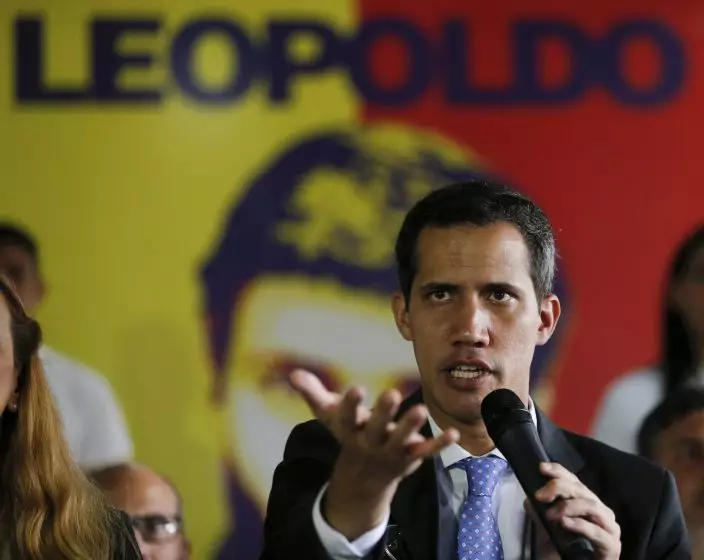
In this Monday, Feb. 18, 2019 photo, Venezuela's self-proclaimed interim president Juan Guaido speaks during a news conference, backdropped by a banner featuring opposition leader Leopoldo Lopez who is under house arrest, in Caracas, Venezuela. Guaido has said tens of thousands of Venezuelans will join forces in caravans to carry humanitarian aid from Colombia into Venezuela, despite President Nicolas Maduro’s objections and soldiers having barricaded a key bridge linking Venezuela and the Colombian border town of Cucuta. (AP PhotoFernando Llano)
The Kremlin has sharply criticized the plan as reckless, accusing Guaido of seeking a pretext to call for a U.S. military intervention.
"If the organizers really want to just deliver some kind of humanitarian aid to the needy, why not use the specialized U.N. agencies that have extensive and invaluable experience in carrying out such operations?" Foreign Ministry spokeswoman Maria Zakharova said in a statement.
Foreign Minister Sergey Lavrov reaffirmed strong criticism of Washington's policy on Venezuela, saying Wednesday that calls this week by President Donald Trump on the Venezuelan military to drop support for Maduro represent a flagrant violation of international law.

FILE - In this Feb. 14, 2019 file photo, Venezuela's President Nicolas Maduro speaks during an interview at Miraflores presidential palace in Caracas, Venezuela. Maduro said Wednesday, Feb. 20, 2019, that 300 metric tons of high-cost medicines and aid was on its way from Russia.“We’re not beggars,” said Maduro. He insisted that Venezuela would pay for the aid and that it was coordinated with the support of United Nations’ agencies. (AP PhotoAriana Cubillos, File)
"This is undoubtedly a direct violation of the U.N. Charter and a direct intervention into the domestic affairs of an independent country," Lavrov said. "When you listen to some representatives of the U.S. administration, it seems that diplomacy is simply ignored."
Lavrov said he hopes "reason will prevail" and the Venezuelan opposition will engage in talks with Maduro to resolve the crisis. He noted a strong opposition in the region to U.S. military interference.
Dmitry Rozental, a deputy head of the Russian state-funded Institute for Latin America in Moscow, said that the Kremlin will continue to offer political support for Maduro — but while carefully weighing its actions.
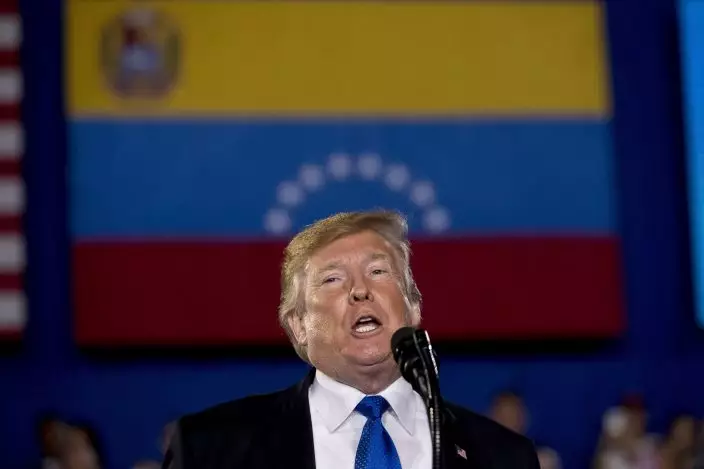
In this Monday, Feb. 18, 2019 photo, President Donald Trump speaks to a Venezuelan American community at Florida Ocean Bank Convocation Center at Florida International University in Miami, Fla., to speak out against President Nicolas Maduro's government and its socialist policies. The Trump administration is accusing Maduro of starving Venezuelans by blocking several tons of American-supplied humanitarian aid stored next door in Colombia. (AP PhotoAndrew Harnik)
"Russia will offer moral support, humanitarian aid and some economic assistance," he said. But, "the Russian leadership won't place Venezuelan interests above the interests of Russia."
He predicted that such aid will be limited in scale, noting that Russia can't afford to satisfy Venezuela's massive needs.
"Russia will offer some aid, but it will unlikely reach a great scale," Rozental said. "It could be some humanitarian aid, as well as some assistance in helping soften the impact of U.S. sanctions."
He added that as part of potential assistance to Venezuela, Russia may provide the chemical thinning agent needed to process the country's heavy crude oil.
Rozental noted, however, that Russian companies and banks will be careful in their contacts with Venezuela to avoid potential U.S. sanctions. He pointed to reports that the Venezuelan state oil company PDVSA's accounts have been frozen by state-owned Gazprombank as an example of such caution.
Meanwhile, at least one aid group warned against security forces or political actors being left to decide who receives aid and where it is distributed, while acknowledging that emergency food and medicine is badly needed in Venezuela.
"It is regrettable that aid has become a pawn in the political chess match between the governments of the United States and Venezuela," Provash Budden of the global humanitarian organization Mercy Corps said.
"Aid should never be used as political bait — both the people who need it and those who risk their lives to deliver it deserve better."
BRUSSELS (AP) — European Union nations endorsed sweeping reforms to the bloc’s failed asylum system on Tuesday as campaigning for Europe-wide elections next month gathers pace, with migration expected to be an important issue.
EU government ministers approved 10 legislative parts of The New Pact on Migration and Asylum. It lays out rules for the 27 member countries to handle people trying to enter without authorization, from how to screen them to establish whether they qualify for protection to deporting them if they’re not allowed to stay.
Hungary and Poland, which have long opposed any obligation for countries to host migrants or pay for their upkeep, voted against the package but were unable to block it.
Mainstream political parties believe the pact resolves the issues that have divided member nations since well over 1 million migrants swept into Europe in 2015, most fleeing war in Syria and Iraq. They hope the system will starve the far right of vote-winning oxygen in the June 6-9 elections.
However, the vast reform package will only enter force in 2026, bringing no immediate fix to an issue that has fueled one of the EU’s biggest political crises, dividing nations over who should take responsibility for migrants when they arrive and whether other countries should be obligated to help.
Critics say the pact will let nations detain migrants at borders and fingerprint children. They say it’s aimed at keeping people out and infringes on their right to claim asylum. Many fear it will result in more unscrupulous deals with poorer countries that people leave or cross to get to Europe.
Europe’s asylum laws have not been updated for about two decades. The system frayed and then fell apart in 2015. It was based on the premise that migrants should be processed, given asylum or deported in the country they first enter. Greece, Italy and Malta were left to shoulder most of the financial burden and deal with public discontent. Since then, the ID-check-free zone known as the Schengen Area has expanded to 27 countries, 23 of them EU members. It means that more than 400 million Europeans and visitors, including refugees, are able to move without showing travel documents.
Some 3.5 million migrants arrived legally in Europe in 2023. Around 1 million others were on EU territory without permission. Of the latter, most were people who entered normally via airports and ports with visas but didn’t go home when they expired. The pact applies to the remaining minority, estimated at around 300,000 migrants last year. They are people caught crossing an external EU border without permission, such as those reaching the shores of Greece, Italy or Spain via the Mediterranean Sea or Atlantic Ocean on boats provided by smugglers.
The country on whose territory people land will screen them at or near the border. This involves identity and other checks -– including on children as young as 6. The information will be stored on a massive new database, Eurodac. This screening should determine whether a person might pose a health or security risk and their chances of being permitted to stay. Generally, people fleeing conflict, persecution or violence qualify for asylum. Those looking for jobs are likely to be refused entry. Screening is mandatory and should take no longer than seven days. It should lead to one of two things: an application for international protection, like asylum, or deportation to their home country.
People seeking asylum must apply in the EU nation they first enter and stay until the authorities there work out what country should handle their application. It could be that they have family, cultural or other links somewhere else, making it more logical for them to be moved. The border procedure should be done in 12 weeks, including time for one legal appeal if their application is rejected. It could be extended by eight weeks in times of mass movements of people. Procedures could be faster for applicants from countries whose citizens are not often granted asylum. Critics say this undermines asylum law because applicants should be assessed individually, not based on nationality. People would stay in “reception centers” while it happens, with access to health care and education. Those rejected would receive a deportation order.
To speed things up, a deportation order is supposed to be issued automatically when an asylum request is refused. A new 12-week period is foreseen to complete this process. The authorities may detain people throughout. The EU’s border and coast guard agency would help organize joint deportation flights. Currently, less than one in three people issued with an order to leave are deported. This is often due to a lack of cooperation from the countries these people come from.
The new rules oblige countries to help an EU partner under migratory pressure. Support is mandatory, but flexible. Nations can relocate asylum applicants to their territory or choose some other form of assistance. This could be financial -– a relocation is evaluated at 20,000 euros ($21,462) per person -– technical or logistical. Members can also assume responsibility for deporting people from the partner country in trouble.
Two issues stand out: Will member countries ever fully enact the plan, and will the EU’s executive branch, the European Commission, enforce the new rules when it has chosen not to apply the ones already in place? The commission is due to present a Common Implementation Plan by June. It charts a path and timeline to get the pact working over the next two years, with targets that the EU and member countries should reach. Things could get off to a rocky start. Hungary, which has vehemently opposed the reforms, takes over the EU’s agenda-setting presidency for six months on July 1.
Associated Press journalists Renata Brito in Barcelona, Spain, contributed to this report.

Migrants sit on the deck of the Sea Watch-3 rescue ship in the Maltese search and rescue zone of the Mediterranean Sea on Oct. 19, 2021. IEuropean Union nations will discuss on Tuesday, May 14, 2024, sweeping new reforms to the bloc's failed asylum system as campaigning for Europe-wide elections next month gathers pace, with migration expected to be an important issue. (AP Photo/Valeria Mongelli, File)

FILE - Migrants disembark from a Greek coast vessel after a rescue operation, at the port of Mytilene, on the northeastern Aegean Sea island of Lesbos, Greece, Monday, Aug. 28, 2023. European Union nations will discuss on Tuesday, May 14, 2024, sweeping new reforms to the bloc's failed asylum system as campaigning for Europe-wide elections next month gathers pace, with migration expected to be an important issue. (AP Photo/Panagiotis Balaskas, File)

FILE - Two men share a meal in a makeshift tent camp outside the Petit Chateau reception center in Brussels, Tuesday, Jan. 17, 2023. European Union nations will discuss on Tuesday, May 14, 2024, sweeping new reforms to the bloc's failed asylum system as campaigning for Europe-wide elections next month gathers pace, with migration expected to be an important issue. (AP Photo/Olivier Matthys, File)

FILE -Migrants rest on the deck of Sea Watch-3 rescue ship in Maltese SAR zone, Tuesday, Oct. 19, 2021. European Union nations will discuss on Tuesday, May 14, 2024, sweeping new reforms to the bloc's failed asylum system as campaigning for Europe-wide elections next month gathers pace, with migration expected to be an important issue. (AP Photo/Valeria Mongelli, File)

FILE - A cemetery, filled with graves mostly from migrants trying to reach the Greek island of Lesbos, is seen from above at Kato Tritos village on the northeastern Aegean Sea island of Lesbos, Greece, on Wednesday, April 17, 2024. European Union nations will discuss on Tuesday, May 14, 2024, sweeping new reforms to the bloc's failed asylum system as campaigning for Europe-wide elections next month gathers pace, with migration expected to be an important issue. (AP Photo/Panagiotis Balaskas, File)

FILE - Opponents of France's immigration law protest with banners that read, "Freedom, equality, fraternity" and "no to the immigration law" at Trocadero Plaza near Eiffel Tower in Paris, Sunday, Jan. 21, 2024. European Union nations will discuss on Tuesday, May 14, 2024, sweeping new reforms to the bloc's failed asylum system as campaigning for Europe-wide elections next month gathers pace, with migration expected to be an important issue. (AP Photo/Thomas Padilla, File)

FILE - Refugees wait in line at the Office of Migration in Brussels on Thursday, Oct. 1, 2015. European Union nations will discuss on Tuesday, May 14, 2024, sweeping new reforms to the bloc's failed asylum system as campaigning for Europe-wide elections next month gathers pace, with migration expected to be an important issue. (AP Photo/Geert Vanden Wijngaert, File)

FILE - Migrants aboard a rubber boat end up in the water while others cling on to a centifloat before being rescued by a team of the Sea Watch-3, around 35 miles away from Libya, Monday, Oct. 18, 2021. European Union nations will discuss on Tuesday, May 14, 2024, sweeping new reforms to the bloc's failed asylum system as campaigning for Europe-wide elections next month gathers pace, with migration expected to be an important issue. (AP Photo/Valeria Mongelli, File)


















